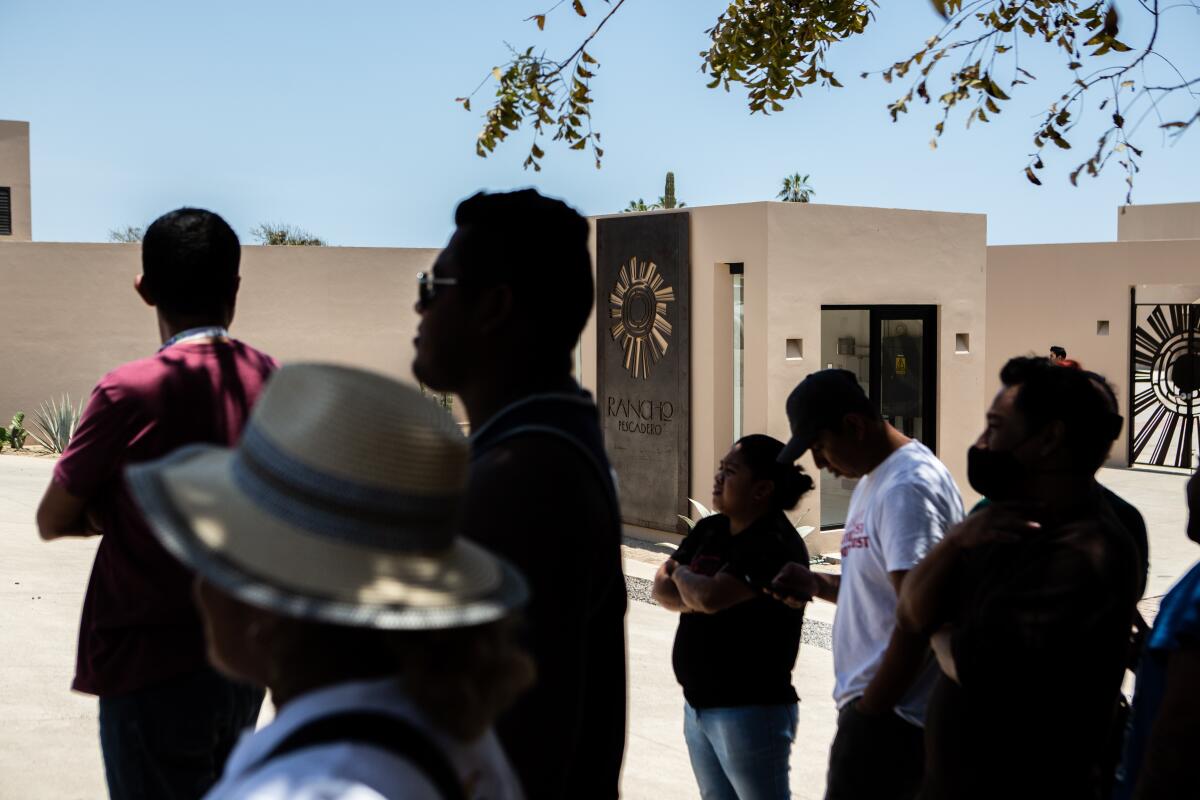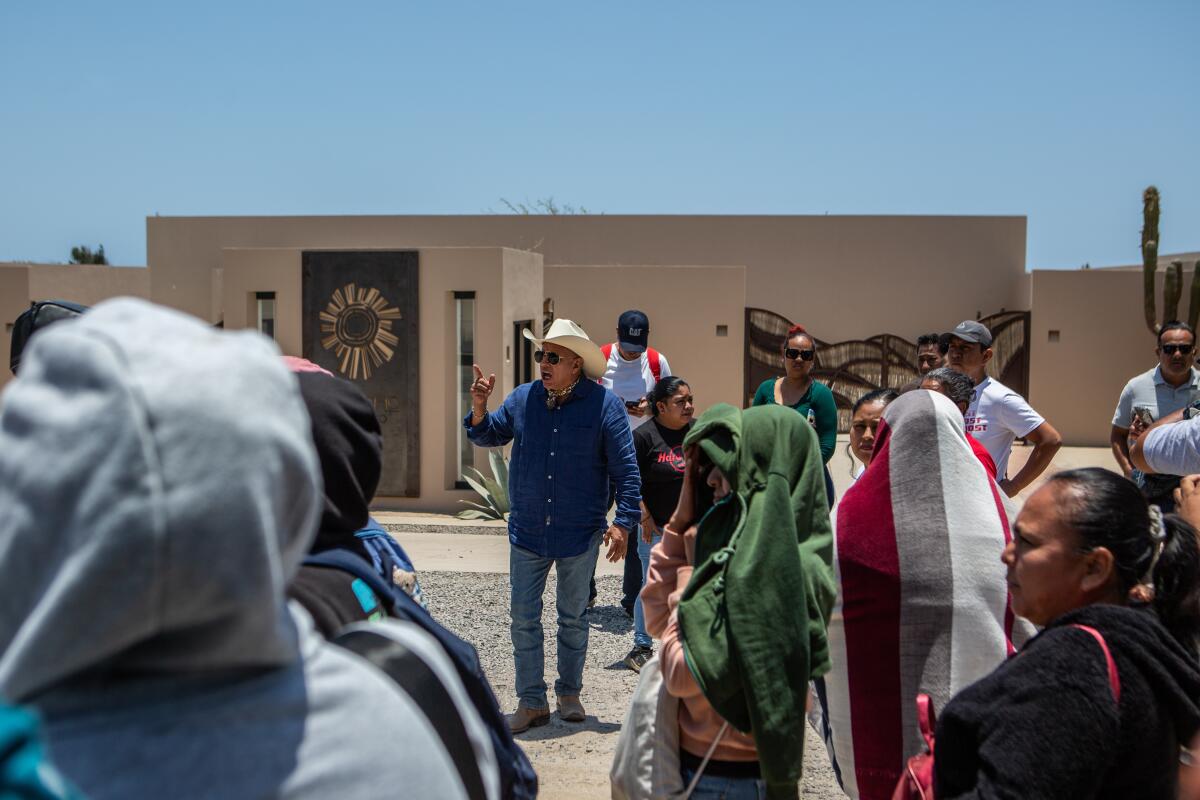Mexican resort where 2 Californians died ignored gas leak problems, employees say

- Share via
MEXICO CITY — Current and former employees at a luxury hotel in Mexico where two Americans were found dead this week said managers of the resort ignored repeated signs of a possible gas leak and disabled carbon monoxide detectors to stop their alarms from disturbing guests.
Ricardo Carbajal, a former night manager at Rancho Pescadero, a $600-a-night beachfront boutique hotel owned by Hyatt, said carbon monoxide detectors sounded frequently over a period of about three months late last year, possibly in connection to a series of outdoor firepits.
In January, Carbajal said, after repeated complaints from guests about the loud alarms, hotel managers disabled the detectors.
“They knew there were problems with gas leaks,” said Carbajal, who stopped working at the resort in March after a dispute over pay. “Everyone was aware of the alarms and that the detectors were off.”
Three current employees who spoke on condition of anonymity also said the detectors were disabled. One of them said they believed it was only the sound of the detectors that was deactivated and that hotel security guards continued to receive alerts when the devices detected gas.
Those current employees and another, who all spoke on condition of anonymity because they feared for their jobs, said hotel managers for months ignored complaints about the strong smell of gas from both guests and employees.
“Housekeepers reported gas leaks, security reported gas leaks, maintenance workers reported gas leaks,” said one of the employees. The employee said that a few days before the guests were found dead, a housekeeper cleaning their room fell ill because of suspected gas poisoning.
The bodies of John Heathco and Abby Lutz, both of California, were discovered Tuesday night inside their room at Rancho Pescadero, which reopened after extensive renovations about a year ago in the beach community of El Pescadero, an hour north of Cabo San Lucas.
The two Americans, including a woman from Newport Beach, are believed to have died of gas inhalation at a resort in El Pescadero, according to authorities.
Autopsies suggest the two died of “intoxication by an undetermined substance,” prosecutors in Mexico’s Baja California Sur state told the Associated Press.
Local police initially reported that gas inhalation was suspected as the cause of death.
Hyatt officials previously said they do not believe the deaths were related to problems with the hotel infrastructure or a gas leak.
A statement released by Hyatt late Friday said the company is “deeply troubled by the recent allegations and speculation about the tragic isolated incident at Rancho Pescadero.”
“Authorities have not yet released the cause of this incident, and the hotel continues to cooperate on their investigation to understand a cause,” the statement said. “We understand authorities immediately tested the air quality in the room after responding to the situation, and at the time, did not report any findings of gas or carbon monoxide and advised that the hotel was cleared to continue normal operations. The hotel continues to monitor air quality.”
The building where the incident occurred was closed as investigations proceeded, the statement said. Additional questions were directed to Mexican authorities.

New accounts from two paramedics who responded to the deaths lend credence to the theory that gas poisoning was likely to blame.
Fernando Valencia Sotelo and Grisel Valencia Sotelo, firefighters who are also siblings, arrived at the hotel late Tuesday after staff discovered the bodies of Heathco and Lutz.
The two firefighters immediately fell ill upon entering the couple’s hotel room, according to a GoFundMe account established to raise money for their medical care. They were being treated at a hospital Friday and undergoing studies to see whether they suffered neurological damage.
Three Americans died in an Airbnb in Mexico City of carbon monoxide poisoning. One woman called her boyfriend saying she felt sick.
In an interview with “Good Morning America,” Lutz’s stepmother, Racquel Lutz, said the young woman had told her family Monday evening that she and Heathco had spent the previous night in the hospital because they felt sick and thought they had food poisoning. Lutz said they had been given fluids intravenously and were feeling better.
“She texted [her father] Monday night to say goodnight, love you, and then we hadn’t heard from her again,” Racquel Lutz said.
Chad Richeson, Abby Lutz’s uncle — who is acting as a spokesperson for the family — said that Lutz and Heathco spent time at the pool Monday but it was not clear how much time they spent in their room.
The Lutz family was traveling to Mexico on Friday to “to bring Abby home” and was not available for further comment, Richeson said.
Abby Lutz did not mention any unusual or powerful smells to her family, Richeson said. Neither the hotel nor Hyatt has reached out to the Lutzes, he said.
In a statement, her family described Lutz, who lived in Newport Beach, as “a light to everyone around her” who was known for her smile and laugh and for “making everyone feel special.”
“It is our hope that more information will come to light to explain what happened to Abby, and why,” the statement said. “This information will help us gain closure, and may prevent this type of incident from happening in the future. We don’t wish for anyone else to go through this tragedy.”
Authorities in Mexico say a gas tank has exploded at a beachside restaurant south of Cancun.
Outside the hotel Friday, several dozen employees gathered for a protest. They detailed a history of complaints to hotel managers over what they described as wage theft as well as safety conditions for employees, including fears over gas leaks.
One of the employees who spoke on condition of anonymity said workers were worried about a possible explosion given the frequent odor of gas. “We are indignant that we reported this, and this tragedy still happened,” the employee said.
Guests also explained about the overpowering smell of gas.
Alexander Coughlin, a real estate agent from San Francisco, stayed at Rancho Pescadero from Friday through Monday. He ate at the hotel’s restaurant, Kahal, on Friday night and was originally seated near a fire feature, which he said ran the length of the restaurant. There were about 30 other people in the restaurant that night, he said, including many of whom sat near the fire.
Within about five minutes of his seating, Coughlin said he was overwhelmed by a strong smell of gas and asked twice to be moved. A waiter agreed with him that the odor was powerful, Coughlin told The Times.
He said the property’s food and beverage director reached out to him by email about his survey rating his stay at the hotel, which included grading his dining experience. He told the director about the smell.
“That was the first thing I mentioned in my email,” Coughlin said. He sent the email Wednesday afternoon but said he hasn’t heard anything more from the resort.

Gas leaks from faulty lines are common across Mexico and have been linked to multiple tourist deaths in recent years.
Last year, three Americans were found dead of carbon monoxide poisoning at their Airbnb in Mexico City.
Linthicum reported from Mexico City, Petri from New York.
More to Read
Sign up for Essential California
The most important California stories and recommendations in your inbox every morning.
You may occasionally receive promotional content from the Los Angeles Times.














